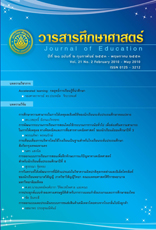การพัฒนารูปแบบการจัดการเรียนการสอนแบบบูรณาการ ทักษะการคิดและการสรรค์สร้างความรู้ สำหรับนักเรียนช่วงชั้นที่ 2 THE DEVELOPMENT OF INSTRUCTIONAL MODEL INTEGARTED WITH THINKING SKILLS AND KNOWLEDGE CONSTRUCTIVISM FOR SECOND LEVEL – PRIMARY EDUCATION STUDENTS
คำสำคัญ:
1. รูปแบบการจัดการเรียนการสอน 2. การพัฒนารูปแบบการจัดการเรียนการสอน 3. การบูรณาการ 4. ทักษะการคิด 5. การสรรค์สร้างความบทคัดย่อ
บทคัดย่อ
การวิจัยครั้งนี้เป็นการวิจัย เพื่อพัฒนารูปแบบการจัดการเรียนการสอนแบบบูรณาการทักษะการคิดและการสรรค์สร้างความรู้ สำหรับนักเรียนช่วงชั้นที่ 2 กลุ่มตัวอย่าง ที่ใช้ในการวิจัย ได้แก่ นักเรียนช่วงชั้นที่ 2 ปีการศึกษา 2551 ซึ่งได้จากการสุ่มอย่างง่าย (simple random sampling) โดยการจับสลากได้ โรงเรียนวัดปากคลองบางคู้ จำนวน 30 คน เป็นกลุ่มทดลอง และโรงเรียนท่าวุ้ง จำนวน 30 คน เป็นกลุ่มควบคุม ซึ่งทั้ง 2 โรงเรียน สังกัดสำนักงานเขตพื้นที่การศึกษาลพบุรี เขต 1 การวิจัยแบ่งเป็น 2 ขั้นตอน ขั้นตอนแรกเป็นการพัฒนารูปแบบการจัดการเรียนการสอนและเอกสารประกอบรูปแบบการจัดการเรียนการสอน ขั้นตอนที่สองเป็นการทดลองใช้รูปแบบการจัดการเรียนการสอน การวิเคราะห์ข้อมูลโดยการหาค่าร้อยละ (percentage) ค่าเฉลี่ย (mean) ส่วนเบี่ยงเบนมาตรฐาน (standard deviation) และสถิติทดสอบที (t-test) ผลการวิจัยพบว่า ได้รูปแบบการจัดการเรียนการสอน ซึ่งมีองค์ประกอบสำคัญ 6 องค์ประกอบ คือ หลักการ จุดประสงค์ โครงสร้างเนื้อหา การวิเคราะห์งาน หน่วยการเรียนการสอน การวัดและประเมินผล การเรียนรู้ เอกสารประกอบรูปแบบมี 3 เล่ม คือ คำแนะนำการใช้รูปแบบการจัดการเรียนการสอน หน่วยการเรียนการสอน และคำแนะนำ การวัดและประเมินผลการเรียนรู้ ทักษะการคิดและการสรรค์สร้างความรู้ของนักเรียนช่วงชั้นที่ 2 ที่เรียนตามรูปแบบการจัดการเรียนการสอนที่พัฒนาขึ้นหลังเรียนสูงกว่าก่อนเรียนอย่างมีนัยสำคัญทางสถิติที่ระดับ .05 และสูงกว่าการเรียนตามปกติอย่างมีนัยสำคัญทางสถิติที่ระดับ .05 ผลงานการสรรค์สร้างความรู้ โดยภาพรวมอยู่ในระดับ ดี และคะแนนเจตคติต่อการเรียนตามรูปแบบของนักเรียนอยู่ในระดับ มาก
ABSTRACT
The research aims to develop the instructional model integrated with thinking skills and knowledge constructivism for second level - primary education students. The samples selected by simple random sampling comprosed 2 groups, 60 students, of second level – primary education students during the 2008 academic year, the experimental group 30 students of Wat Pagklong Bangkhu School, and the controlled group 30 of Thawugn School. Both schools were under the Lop Buri Educational Service Area Office 1. The research procedures had 2 steps, first, developing the instructional model and supplementary materials, second, testing testifying the developed model. The data was analyzed to calculate percentage, mean, standard deviation and t-test. The findings revealed that : the instructional model developed comprised 6 components, i.e. rationale, objectives, content structure, task analysis, instructional units, and measurement and evaluation. The supplementary materials accompanied comprised 3 copies namely : guideline of using instructional model and instructional units, and guideline in learning measurement and evaluation. The posttest of thinking skills and knowledge constructivism of the second level – primary education students, studies based on the developed instructional model was higher than the pre-test with .05 statistically significant difference and so was the normal study. The output of knowledge constructivism was rated at a high level. The students attitude towards said study was also rated at a high level.
ดาวน์โหลด
รูปแบบการอ้างอิง
ฉบับ
ประเภทบทความ
สัญญาอนุญาต
ลิขสิทธิ์ของบทความที่ปรากฏในวารสารศึกษาศาสตร์ มหาวิทยาลัยบูรพา เป็นของวารสารศึกษาศาสตร์ มหาวิทยาลัยบูรพา ทั้งนี้บทความทุกเรื่องผ่านการตรวจสอบความถูกต้องทางวิชาการจากผู้ทรงคุณวุฒิ ข้อความและข้อมูลของบทความในวารสารฯ เป็นแนวคิดของผู้แต่ง มิใช่เป็นความคิดเห็นของกองบรรณาธิการ และมิใช่ความรับผิดชอบของคณะศึกษาศาสตร์ มหาวิทยาลัยบูรพา ไม่สงวนลิขสิทธิ์การนำไปใช้ประโยชน์ทางวิชาการแต่ต้องอ้างอิงแสดงแหล่งที่มาและอยู่ในขอบเขตของกฎหมายลิขสิทธิ์



